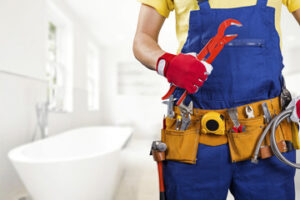Plumbing is integral to the comfort and safety of your home. But, like any system it can become faulty over time.

Knowing basic plumbing repair skills can save you money and stress. From clogged drains to leaking pipes, this guide will teach you how to tackle some common home repairs. Contact Plumbing Repair Mckinney TX for professional help.
Leaky pipes are a major plumbing issue that should be dealt with as quickly as possible. They can lead to water damage, mold growth and other costly problems if left unattended. Fortunately, there are several effective repair methods for leaky pipes, including pipe repair tape, plumber’s epoxy putty and pipe clamps. These quick fixes can provide temporary relief until a professional plumber can arrive to assess the situation and determine the appropriate long-term solution.
The most common sign of a leaky pipe is a damp spot or puddle in your home. Other symptoms include bubbling paint, warped floors or ceilings, and musty odors caused by the accumulation of moisture. If you notice any of these issues, turn off your home’s water supply at the main valve and contact a plumber as soon as possible.
In many cases, a leaking pipe is the result of a broken seal at a joint, fitting or valve. Over time, the rubber or metal seal can break down due to age, pressure or other factors. When this happens, water can begin leaking around the joint and can cause significant damage if not addressed immediately.
Before attempting any DIY solutions, it’s important to shut off your home’s water supply at the nearest valve. This will stop the flow of water and prevent any further damage to your property. You should also take pictures of the damaged area and contact your insurance company to discuss coverage options if necessary.
For a quick fix, you can use pipe repair tape or epoxy putty to create a seal at the leaking joint. These products are easy to apply and can be purchased at most hardware or home improvement stores. Follow the product instructions carefully to ensure proper application and a strong, long-lasting seal.
For more serious leaks, a professional plumber may need to assess the extent of the damage and drain the affected area to make sure that any existing water is properly drained before beginning repairs. Once the area is dry, a new section of pipe can be cut to size and then welded or soldered into place. The plumber will also make sure that all connections are tightly sealed and insulated to prevent future leaks.
Clogged Drains
Clogged drains are a common plumbing problem that can be a real pain, but there are some steps you can take to fix them yourself. First, try using a plunger and if that doesn’t work, use a draining cleaner. Make sure you follow the directions on the package and wear gloves and eye protection when using chemical cleaners. Allow the cleaner to sit in the drain for the recommended time and then rinse with hot water to clear away any residue.
If you have a stubborn clog that snaking and other DIY methods can’t fix, call a professional plumber to see what the problem is and how to address it. You might need a new drain trap or an entire pipe replacement depending on the cause of the clog.
Some clogs are caused by hair, soap scum, grease, or food scraps. You can minimize these clogs by using a mesh drain cover and washing your dishes in the bathtub instead of the sink. Adding a drain snake to your arsenal can also help keep clogs at bay, especially in kitchen drains where hair and food waste are more likely to accumulate.
Frequent clogs are a sign of a larger issue and may indicate that you have a broken pipe or blockage somewhere in your home’s drain line. Inspect your home’s pipes on a regular basis to catch problems before they get out of hand.
If your clog is caused by soap scum, you can try pouring boiling water down the drain. This can cause a bubbling reaction that dissolves the clog and flushes it away. You can also reduce soap scum buildup by regularly using a drain cleaner or vinegar. You can also use a mixture of baking soda and salt to create a powerful clog-busting solution. However, if your clog is caused by tree roots or other serious issues, a plumber will be needed to solve it. 128 Plumbing, Heating, Cooling, & Electric can assist with all your drain cleaning and repair needs. Our experts have the tools and expertise to tackle even the most stubborn clogs and sewer backups.
Sewer Backups
A sewer backup is one of the most serious plumbing problems a homeowner can face. It can result in thousands of dollars worth of damage to floors, walls and furniture. Additionally, it poses health risks due to exposure to raw sewage. The best way to protect your home against this problem is to be proactive about maintaining and repairing your drain lines.
The main causes of a sewer backup are clogs and cracks in the line, as well as tree roots infiltrating and damaging the lines. If you suspect that there is an issue with your sewer line, it’s important to call a plumber right away. The plumber can determine if the problem is in your building sewer lateral or in the city’s sewer main, and recommend the correct repair solution.
Symptoms of a sewer backup include toilets that won’t flush, gurgling noises when water or sewage is draining, and standing wastewater around sinks, tubs and drains. If you experience any of these issues, shut off the water valve for your house and call a plumber right away.
In some cases, a backwater valve can help prevent sewage from backing up into your home during heavy rains or blockages in the municipal sewer system. If you have older cast iron or clay pipes, a backwater valve can also help to reduce the risk of them breaking or cracking. The plumber can install the device at your home’s drain line and connect it to the city’s sewer line, which will close when the water pressure in the city pipe gets too high.
Most sewer clogs are caused by things that don’t belong in the drain line, such as kid’s toys, diapers, sanitary products, keys and other metal items, fats, oils and grease. The plumber can teach you the best way to dispose of these items and how to keep debris from entering the sanitary sewer system.
You can take a number of steps to prevent building sewer backups, including removing any trees from the area directly above your house’s drain line. You should also avoid flushing any paper products other than toilet paper, and be sure to throw away fats, oil and grease in a sealed container. You can also have a plumber inspect your home’s pipes and drains on a regular basis and perform rooter services when needed.
Repiping
Repiping involves replacing the entire plumbing system in your home, usually with newer pipes that can offer better water quality and pressure. It may be necessary for older homes with corroded or leaking pipes, and it’s often a good idea before you start a major home remodel. Repiping can also help improve the appearance and odor of your home’s water, making it more appealing to potential buyers if you’re planning to sell.
A professional plumber will perform a thorough inspection of your home’s plumbing before the repiping process begins. This will allow them to pinpoint the location of problems and decide whether a partial or full repipe is required. They’ll also help you choose the right materials for your new pipes, depending on your budget and preferences. For example, copper is a durable and long-lasting material that can resist corrosion, while PEX is a flexible and affordable alternative.
If you have multiple leaky spots around your home, it’s a sign that the pipes are failing and need to be replaced. Replacing these old pipes will help reduce your risk of future issues and save you money on costly repairs.
While pipe repairs can address immediate problems, they won’t fix underlying causes that could lead to future issues. For instance, if you have a corroded pipe, it’s likely that the issue will resurface unless you replace the entire pipe. Repiping offers a more comprehensive solution, eliminating old pipes and installing a fresh new system that’s designed to last for decades.
During the repiping process, expect some noise and dust in your home, as the plumbers will have to cut into walls, ceilings, or floors. You can mitigate these effects by covering any furniture you don’t want covered in dust and using earplugs while the work is underway. It’s also a good idea to stock up on bottled water and other necessities in case the water supply is shut off for a few days during the repiping process. Once the work is finished, the plumber will turn the water back on and clean up any mess.
